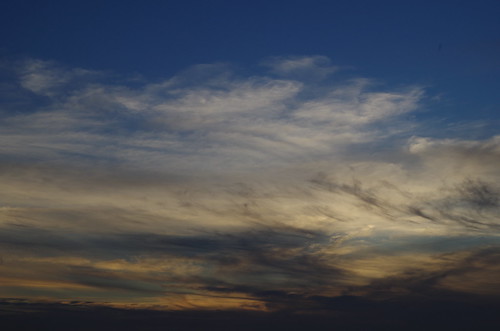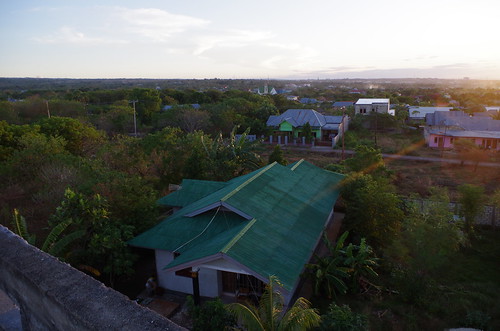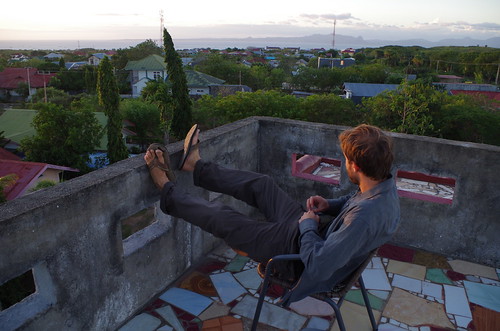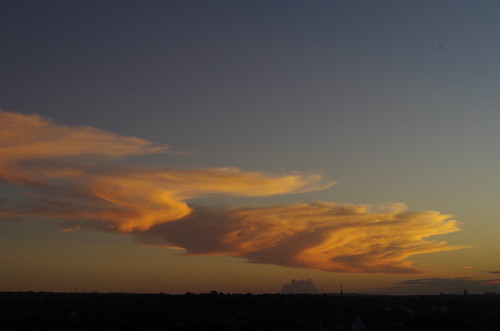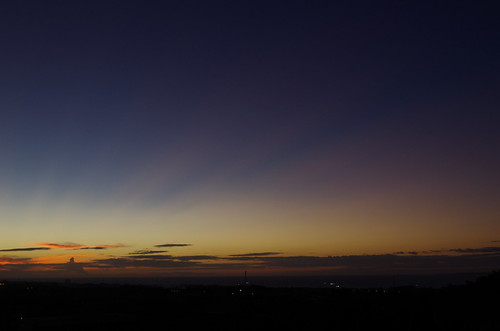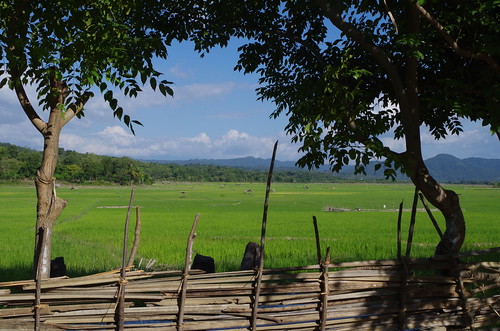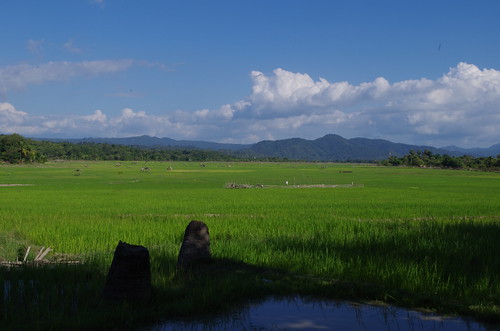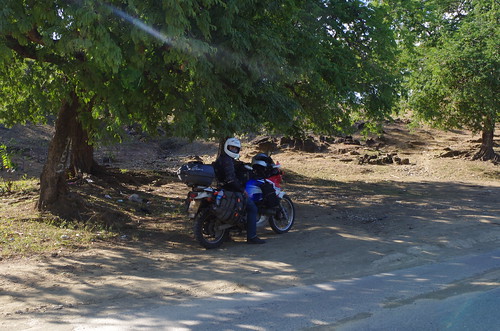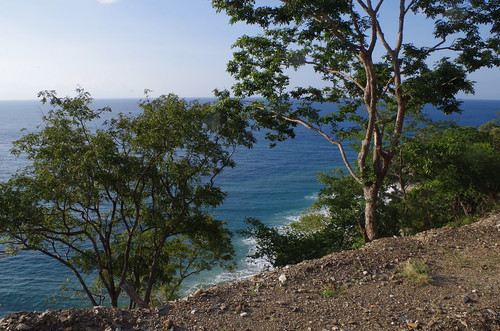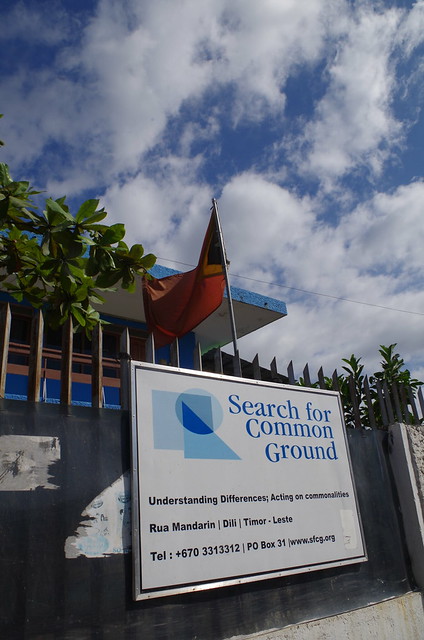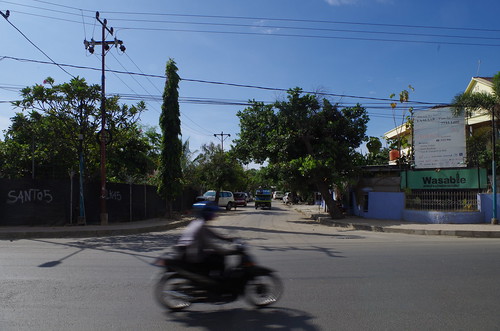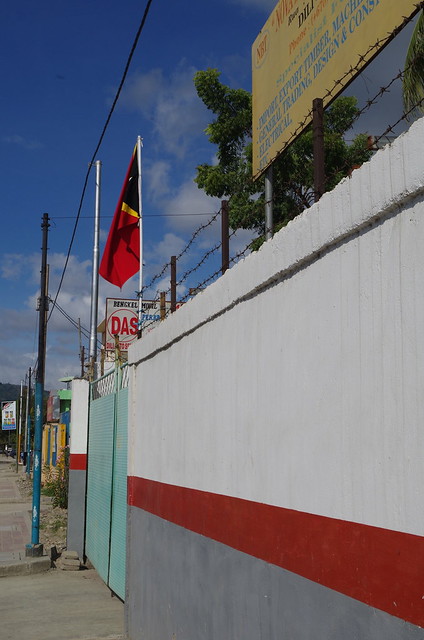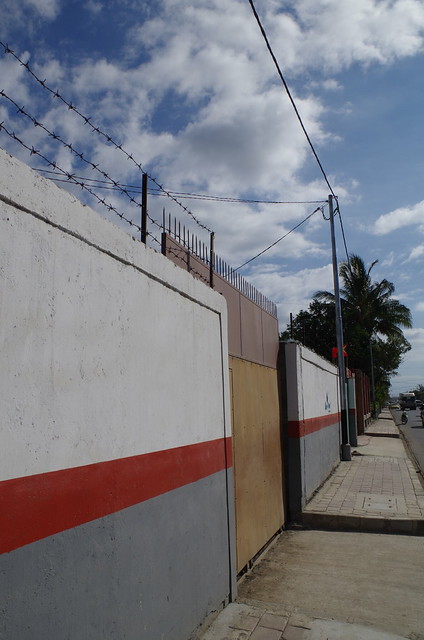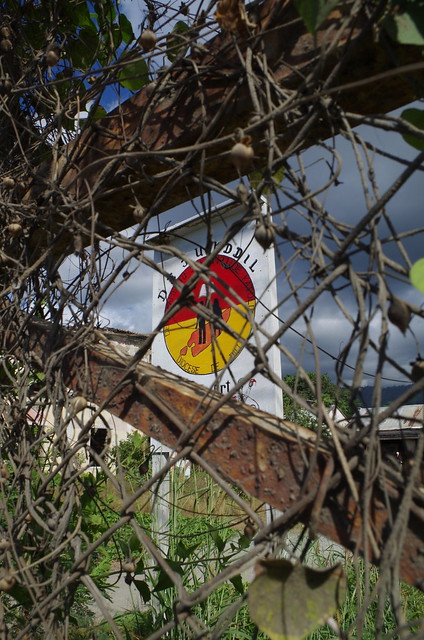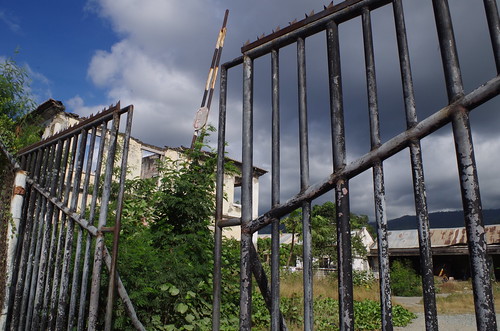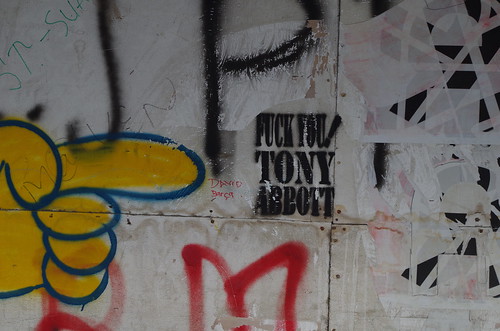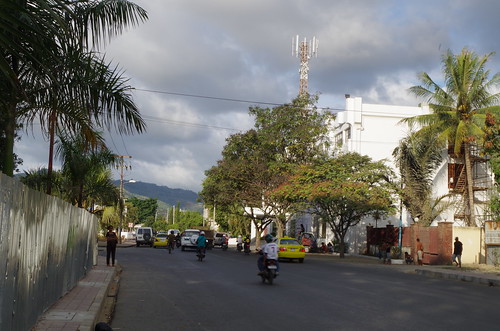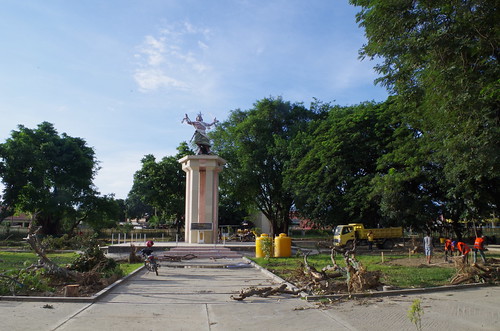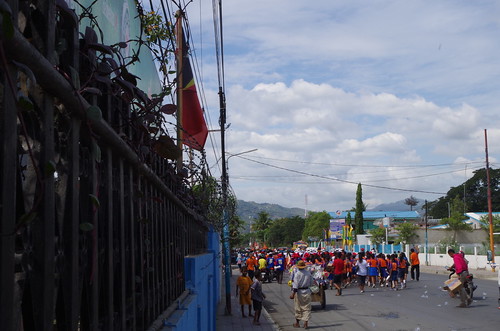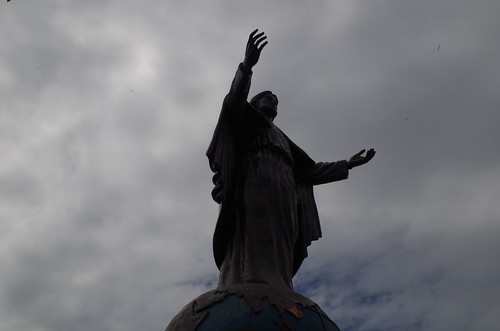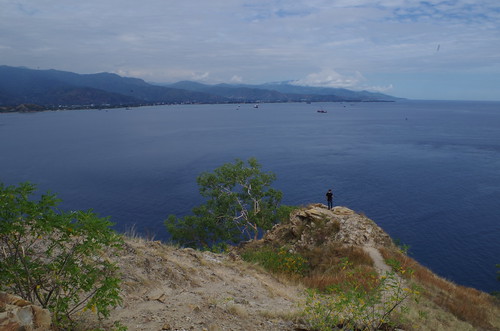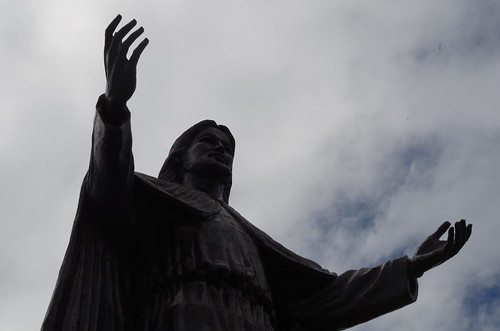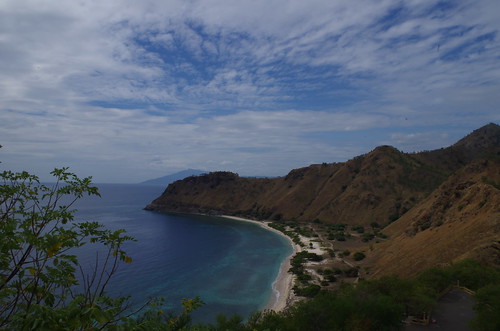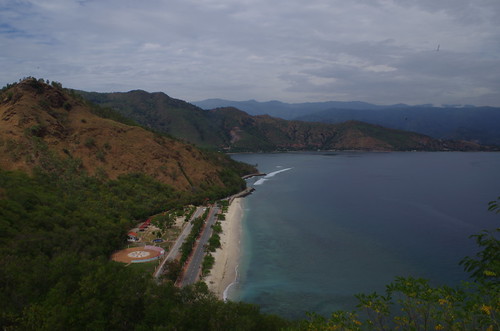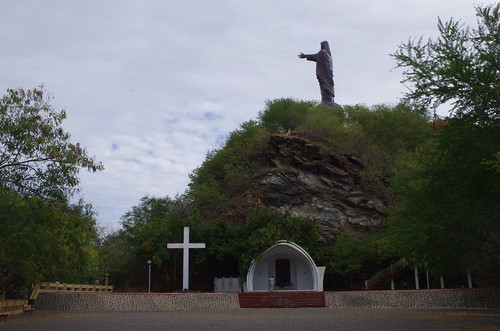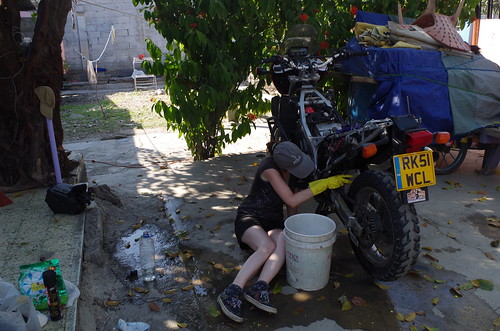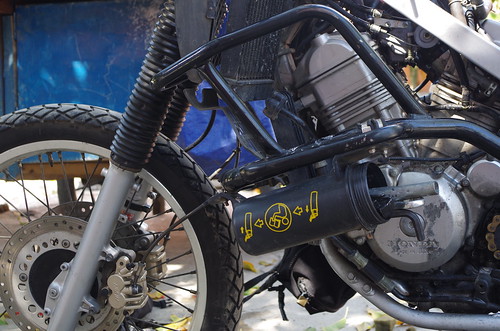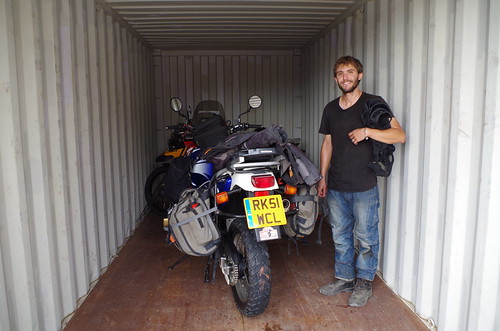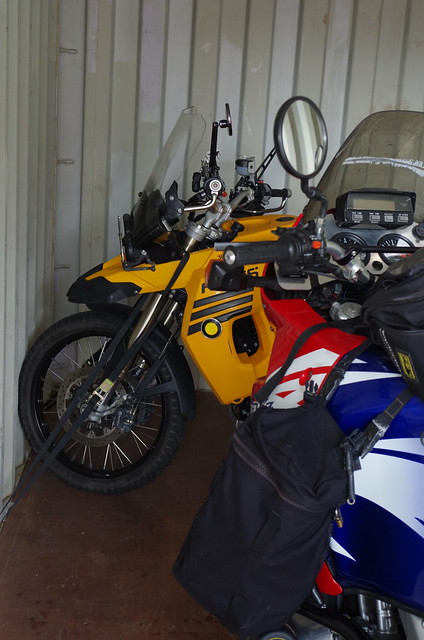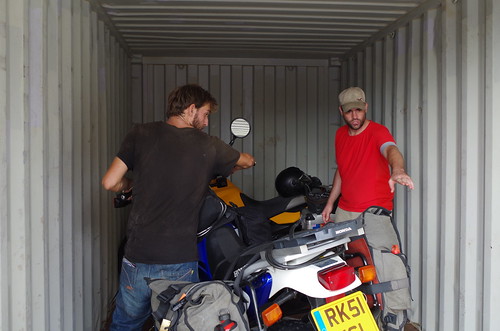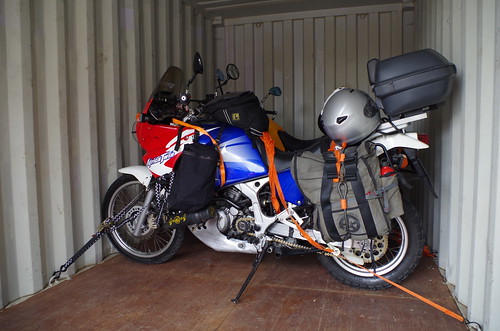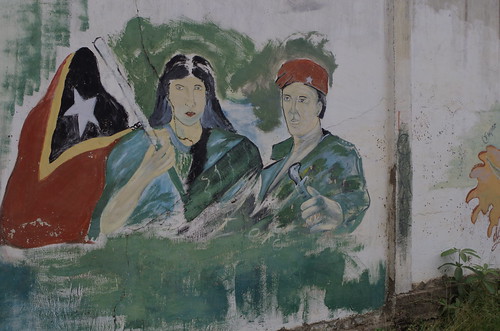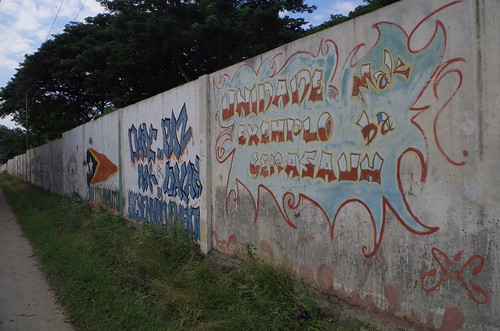We spent a wonderful few nights at the Hasienda. After the dirt and rough of the ferry it just felt great to be somewhere clean. There was nothing living in our room other than ourselves, and we even had a proper hot shower. We did very little other than relax, although we did manage an excursion to the supermarket to buy cleaning stuff in preparation for the mammoth pre-quarantine bike clean. Visiting the supermarket was an event in itself, as it had been a long time since we had been in such an establishment. We did notice though that a mouse had been at some of the cakes on the shelves, just to remind us that we were indeed still in Indonesia.
After three days it was time to relocate and make our way to Timor Leste. Indonesia had been a real mix of experiences. The good had hugely outweighed the bad, but we were definitely ready to leave. The country had given us some of the most epic landscapes so far, brought us to some of the kindest people, and provided some excellent food. On the flipside, it had also been one of the most frustrating places to travel so far. Sometimes it was hard not to get angry about how little people respected the environment. Chucking litter in the sea and out of cars seemed to be common practice, and we heard that fishing with dynamite was destroying many of the coral reefs. On top of that, the more touristed areas sometimes felt very grabby. There were a lot of things we were going to miss, but we were ready for something new.
We were aiming to get from Kupang to Dili in just one day. Everything we had heard suggested it would be possible but tiring, so we were up and on our way bright and early. The road was twisty but mostly good, and we were hoping to make steady progress. This was going well until we spotted a police car coming from the opposite direction, sirens blaring. It was acting as an escort for a long convoy of buses and mini-vans, which (judging by the banners on the bumpers) were all off to some sort of Christian meeting in Kupang. Everyone was clearly excited, and all were driving erratically as a result, trying to overtake each other or just not bothering to use their side of the road. It was genuinely terrifying, and the stream of vehicles seemed to last an eternity. Eventually they ceased bar a few stragglers, which was much easier to deal with.
The relief didn't last for long, and within a few miles we came face to face with the second round. If possible, these drivers were even worse. The lack of regard for the life and limb of anyone who might be in the opposite (our) lane was shocking, even by Indonesian road standards. We decided to pull on to the narrow verge and let them all pass, but unfortunately it was a lot softer than it looked, and we dropped the bike into the road. We picked it up quickly, the ensuing panic not assuaged by the fact that a bus was driving towards us, making no effort to stick to their side of the road or slow down. They did beep their horn though, which was rather unhelpful.
Thankfully that was the end of it, and the remainder of the drive to the border was far less eventful. Oli sorted out the official stuff whilst I entertained a bunch of kids by trying to talk to them about football. Happily, no expertise was required, as when I asked if they liked David Beckham they all got very excited. They thought it was great that we were from Manchester as well. I think I will be forever grateful that we spent a few years living there, as it has been a great ice-breaker all over the world.
We drove the very short distance to the East Timor side, and were surprised to see that the border post was very new and fancy looking. It was a huge contrast to the Indonesian side, which had consisted pretty much of a concrete shed, split into different sections. We filled out a couple of short forms, handed over our authorisation letters along with $30 each, then went through the customs check. This was not particularly thorough, as they only scanned our helmets and jackets, and were not at all bothered about the fact that we both set off the metal detectors. We finished the border process off with Oli going to register us with the army, whilst I sat in the shade with an elderly guard. He didn't speak much English, but we managed a small chat whilst he kicked back and smoked a cigarette. Timor seemed to be a very relaxed place, and we were liking it already.
We had been expecting terrible roads to Dili. Whilst they were not great, they were way better than we anticipated. A huge bonus was the reduced volume of traffic, which meant a lot less to concentrate on. The countryside was beautiful, and even though we were exhausted we couldn't resist hopping off the bike to photograph the vibrant green rice paddies.
After a while the route switched from a narrow potholed stretch to a wide, gravel road. Works were in full flow, and we later found out that Timor Leste has plans to sort out the whole network in the next two years. For the time being however, it was dusty and tough going. I had suggested getting the bike power washed in Kupang to give us a head-start on the cleaning, and was immediately glad that Oli had rubbished the idea. Both the bike and ourselves were covered with a respectable layer of dust by the time we re-joined the asphalt, so it would have been utterly pointless.
We made it to Dili with over an hour to go until nightfall, which was much better than we had expected. We were staying in Dili's only backpacker accommodation, and from what he had heard we weren't quite sure what kind of place awaited us. Happily, it far surpassed our expectations, and although it was basic it was spotlessly clean. We treated ourselves to some Indian food from over the road, chatted to some fellow guests for a bit, then passed out exhausted.
In need of a day off after the long drive, we set off to explore the city. We had been expecting it to be a little like Kathmandu or one of the rougher Indonesian cities; dusty, ramshackle and littered with rubbish. It was actually nothing like we imagined, and we rather liked it. The main road was wide, with very few buildings above one or two storeys. It was surprisingly clean and relatively quiet, with far less traffic than the average Indonesian town. It did feel slightly under siege, with most businesses having huge gates and barbed wire topped walls, a reminder of the fact that the U.N. only left the country at the end of 2012. The whole city had a laid-back feel though, nothing like the hectic and noisy urban mess we had expected.
Wanting to make a head-start on the shipping, we decided to walk down to the SDV office. Shipping options between Dili and Darwin are notoriously limited and unreliable, at least in overlander circles. Most people go with Toll, but after hearing that another couple had waited eight weeks in Darwin, we were keen to avoid them. From the first meeting SDV seemed a relatively safe bet. Even though they were the pricier option, we decided to go with them. We filled the rest of the afternoon with a visit to the Resistance Museum, which documented the long struggle for Timorese independence. It was a thoughtful and interesting exhibition, although we both felt that it would have been nice to have some information on the struggles post independence, as it made no mention as to why the U.N. presence was needed for the next ten years.
The history of East Timor is a difficult one. Colonised by the Portuguese in the 16th Century, they achieved independence in 1975. Just nine days after this Indonesia invaded, killing thousands of civilians and executing four Australian journalists. It is estimated that between 25 and 33% of the population lost their lives during the war. Indonesia had the support of many Western governments, notably the U.S.A. and Australia, both of whom saw the takeover as in their own interests. Much of the thinking behind this support can be traced (somewhat predictably) to the overwhelming fear of communism that characterised this period. The Timorese suffered under Indonesian rule until 2002, eventually re-achieving independence and beginning to forge a new nation.
We had originally planned to drive up to Hatubulico the next day, but when it came to leaving we just couldn't face it. Everyone was telling us how bad the road was and that it was still very much the rainy season up in the mountains, so we were unlikely to get the good views. We were just exhausted, so decided instead to stay in Dili and get on with the cleaning. Knowing now how long the big clean took, this was undoubtedly the right choice.
Wanting to at least get some way out of Dili, we paid a visit to the Cristo Rei, an enormous statue of Jesus sat dramatically on a headland overlooking the city. Apparently the statue was a gift from Indonesia whilst the country was still under occupation, and is perhaps Timor Leste's best known landmark. The road there took us past picture perfect beaches, astoundingly empty considering their proximity to the capital and the fact that it was also a weekend. Such a quiet city beach seems unimaginable anywhere else in the world. If you listen to the FCO advice, saltwater crocodiles are a risk here, but it didn't seem to put off the few intrepid swimmers and kayakers.
The climb up to Christo Rei was relatively short, only made tiring by the stifling heat and humidity. En route to the peak were bronze reliefs showing the stations of the cross, and we also had incredible views over two fantastic, deserted beaches. As we stood on the headland overlooking Dili, it seemed crazy that the capital could be so unobtrusive against the mountains. We couldn't help thinking that in ten years this coastline is likely to be completely unrecognisable. I hope the area is eventually developed responsibly, as it really is a stunning natural setting.
Touristing over, it was time to get on with the cleaning. We had predicted that three hard days would be required to get the bike up to quarantine standard. Oli popped down to the nearest pressure wash to give us a much needed head start, and then we got down to it. At first it was kind of fun, although we immediately started to re-evaluate how long it might take. Just cleaning the bash plate took a couple of hours, as it was caked in oil, grit and mud from many different countries. Still, we thought logically that it might be the worst bit, so maybe the other tasks would be faster.
How wrong we were. The cleaning ended up taking us eight full days. The bike is thirteen years old, and has never had a clean this deep. Adding this much ingrained crap to a year's worth of bad, unsealed roads did not make for an easy job. Low points included Oli spending two days picking flies and grit out of the radiators, and highlights included me stabbing myself in the hand with a screwdriver and Oli scraping a load of skin off his finger. Lazily we took to sorting the worst bits with petrol, which was great for cleaning but not so good for our skin. Everyone doing our route has to do this clean, but we just weren't prepared for how physically and mentally exhausting it would be. On the last night before loading we were still putting the bike back together at 10:30 p.m.. It had been a hard slog.
In the midst of all this we had given up on SDV and reluctantly decided to go with Toll. SDV were terrible to deal with after the first meeting, and couldn't give us a straight answer on anything at all. Unfortunately for us the Toll office lies at the end of a very dusty road, so we were apprehensive about having to drive our pristine bike there. When we got to the turn-off it was unhelpfully blocked with a danger sign and some tape. We needed to go down there, so just moved it and drove through, a definite indicator of how long we have been away from Europe!
We gave the bike a quick wipe down before beginning loading, totally paranoid about every speck of dust. Happily, another biker (Amos from Switzerland) was also around, so I was quite happy that I could leave the lashing to the boys. Otherwise the situation would definitely have been Oli asking me to help make decisions I didn't have a clue about, which would only end in frustration and quite possibly minor disagreement. We were also pleased that our beloved December had some company in the form of Amos' BMW.
Ideally we would have loved to spend the next day relaxing and sorting out our luggage for Australia. Sadly though, the only vaguely affordable flight that week was the next morning at seven a.m., which meant a very early start. We were going to quite miss our home at the Backpackers. The owner, Rita, was a great lady, and had looked after us well. It seemed she was going to miss us also, as she knocked on our door before bed to give us each a parting gift of a scarf in East Timor colours. It was a lovely gesture, and we felt extra pleased about the cake we had bought to leave in our room as a surprise for her and the staff.
Like good little Europeans, we left early so that we could get to the airport two hours before departure. Evidently this is not how things are done in Timor, as when we arrived we found the airport completely dark and closed. After around half an hour the staff arrived and opened things up, and we discovered that the Airnorth check in desk was merely two portable trolleys and laptops. All our details had to be keyed in manually, so it was kind of a slow process.
Eventually it was time to go through security. To say things were a little lax is an understatement. The guy manning the x-ray machine was wearing an ancient football shirt, from the days where Sega was a sponsor. I set off the metal detector as I walked through, and immediately started patting my pockets to locate the offending item. Amazingly the guard's response to this was a shake of the head and a casual wave to tell me not to worry about it. Hard to imagine that at Heathrow!
Even though we had spent most of our time in Timor Leste elbow deep in dirt and grease, we had really liked the place. Typically the FCO advice had made it sound like a dangerous hell hole, with the information including the advice that if we became aware of military activity, we should take cover and stay away from the windows. They had also advised that gang fights were common between martial arts clubs in Dili, involving knives and machetes. We had found it a peaceful city full of friendly people, yet another reminder that the foreign office advice should be taken with a sense of balance.
We were looking forward to Australia, but after seven months in South East Asia we were expecting a culture shock. All the things that have become normal to us would no longer be common place. No more chickens on the city streets, no more babies / animals on scooters and no more children carrying machetes. Sensible driving, not sticking out like a sore thumb wherever we go, no more avoiding the tap water. No longer will we amuse folks just by going to the market, and no more people will be yelling “Valentino Rossi” at us every time we stop somewhere. No more drive by high-fives, no more super-cheap, delicious street food. All frustrations aside we just love the liveliness of Asia and the sense of anything being possible, the rules flexible. It had changed a lot of our perceptions and ways of thinking, leaving an almost tangible impression. We were going to miss it immensely.
